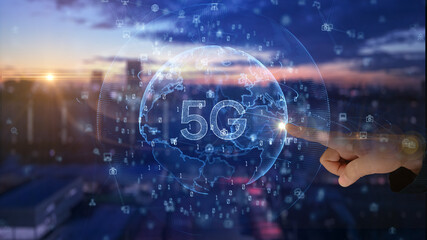5G technology is set to revolutionize the way we experience connectivity, offering speeds that are exponentially faster than current 4G networks. With download speeds potentially reaching up to 10 Gbps, 5G enables seamless streaming of high-definition content and ultra-fast downloads. This incredible speed allows for near-instantaneous communication, which is crucial for applications like video conferencing, virtual reality (VR), and gaming. As 5G becomes more widespread, it will dramatically enhance user experiences across various industries, allowing for smoother interactions, faster data transfer, and a more connected world overall.
5G and the Internet of Things (IoT)
One of the most exciting applications of 5G technology is its ability to enhance the Internet of Things (IoT). IoT refers to the network of interconnected devices, from smart home appliances to wearable health trackers, that communicate with each other and share data. With 5G’s low latency and high bandwidth, IoT devices can now operate more efficiently, offering real-time updates and interactions. This means smarter cities, where traffic lights adjust based on traffic flow, and healthcare systems where doctors can monitor patients remotely with real-time data. The possibilities for 5G in IoT are endless, driving innovation in everything from home automation to industrial applications.
5G and Enhanced Mobile Gaming Experiences
5G is also transforming the mobile gaming industry by offering gamers an experience that was once unimaginable. With the ultra-low latency of 5G, online gaming becomes smoother and more responsive, eliminating lag and interruptions. Players can enjoy high-quality graphics and immersive gameplay, even on mobile devices. This improved connectivity also enables cloud gaming, where games are streamed directly from the cloud, eliminating the need for powerful hardware. The combination of fast speeds and low latency ensures that mobile gaming will reach new heights with 5G, allowing for more interactive and enjoyable experiences on the go.
5G’s Role in Advancing Smart Cities
As cities around the world look to become smarter, 5G technology is playing a pivotal role in their development. Smart cities use a network of interconnected devices to improve efficiency and quality of life for residents. With 5G’s ability to handle massive amounts of data in real time, cities can optimize traffic management, reduce energy consumption, and enhance public services. For example, 5G-enabled sensors can monitor air quality, water usage, and waste management systems, allowing authorities to respond quickly to issues and improve sustainability. The combination of 5G and smart city technologies promises to create more livable, efficient urban environments.
The Role of 5G in Healthcare Innovation
5G is expected to have a profound impact on the healthcare sector, offering advancements in telemedicine, remote monitoring, and patient care. With faster internet speeds and reduced latency, doctors can conduct remote consultations in real time, ensuring that patients receive timely care regardless of their location. Additionally, 5G can support wearable devices that monitor vital signs continuously, transmitting data to healthcare providers instantly. This allows for proactive interventions and better management of chronic conditions. As 5G becomes more widespread, its role in healthcare will continue to evolve, improving patient outcomes and access to care.
5G and Autonomous Vehicles
Autonomous vehicles (AVs) are another area where 5G technology is poised to make a significant impact. 5G’s ultra-low latency allows AVs to communicate with each other and with infrastructure in real time, which is critical for ensuring safety and smooth operation. For example, AVs can receive updates about traffic conditions, road hazards, and other vehicles’ movements, allowing them to make split-second decisions. This will help reduce accidents and improve the efficiency of transportation systems. As 5G networks expand, the widespread adoption of autonomous vehicles becomes more feasible, bringing us closer to a future of safer, more efficient roads.
Conclusion
5G technology is set to revolutionize the way we connect, communicate, and interact with the world around us. From enhanced internet speeds to innovations in smart cities and healthcare, the impact of 5G will be far-reaching. As the technology continues to roll out globally, we can expect a new era of connectivity, where faster, more efficient communication leads to significant advancements in various sectors. While challenges remain, the future of 5G holds immense potential, and its widespread adoption will undoubtedly transform the digital landscape in ways we can only begin to imagine.
